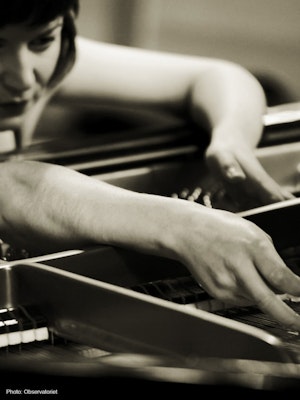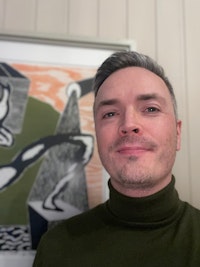In 2016, a few months before this interview took place, I had the opportunity to experience Ellen Ugelvik playing together with the Oslo Philharmonic Orchestra and composer Trond Reinholdtsen at Ultima, the Oslo Contemporary Music Festival. Or perhaps I should say that the piano playing was carried out primarily by a robot-controlled piano, which produced amazing sounds that no human being would be capable of creating.
In the meantime, we watched the live broadcast from backstage, where both Ugelvik and Reinholdtsen functioned for the most part as stage actors. They expressed a healthy portion of doubt and frustration – with considerable humour and self-irony – in connection with the role of the soloist and contemporary music in general. After Ugelvik had played a little for us at last, she crawled under the grand piano and pretended to chop off her fingers in front of the camera.
This, then, was the concerto that marked the final phase of her research project at the Norwegian Academy of Music. What on earth was she was trying to get across?
Kudos from the composers
On a Monday in January 2017, I am visiting her in her office at the Academy of Music. I try to find out how she ended up with the kinds of concertos she is presenting now, where she is an actor, performance artist and pianist all at once. Ugelvik has been playing music since the age of five but didn’t find everything she was looking for in classical music. The solution arrived when she was a teenager.
"When I was 15 years old I had a teacher who introduced me to a new repertoire and encouraged me to explore the vast sound potential that lies inside the grand piano. When I did, it gave me an incredible kick, and this kind of music spoke to me in a completely different way than classical music," she says.
"Then, when I had progressed at the conservatory to the point where I could specialise in something, it had to be contemporary music. It made me feel much more alive as a performer, and it was unbelievably exciting to investigate the multifaceted genre of contemporary music."
Ugelvik eventually acquired expertise in newly composed music and has worked more and more closely with the composers as she has tackled a constant stream of new works. Her efforts to promote new music are obviously popular among Norwegian composers, which became evident when the Norwegian Society of Composers named her Composer of the Year in December 2016.
Expanding the borders
The point of departure for her research project was developing methods of becoming a more competent soloist herself, in a musical landscape where the role one plays can vary immensely from one concerto to the next. In order to conduct research on working methods and the role of the piano soloist in contemporary music, she has prepared and presented the premieres of five different concerti for piano and orchestra.
"By going through the process of initiating, rehearsing and presenting these concerti, I have discovered that an increased awareness of the potential and scope inherent in the role of the soloist is conducive to achieving a result that sounds as good as possible," says Ugelvik.
She wants her project to expand the borders within the hierarchy that currently exists between the composer, conductor, soloist, orchestra and production system.
"My role develops through the music I am working with at any given time, and each work brings its own unique challenges with it. When I started the project I was interested in how I could become a more competent soloist myself when encountering new works. But gradually I began to work more with piano concerti as collective processes, where I assumed a more progressive role as a soloist participating in the creation of the work rather than serving as a medium for the music to pass through," she explains.




